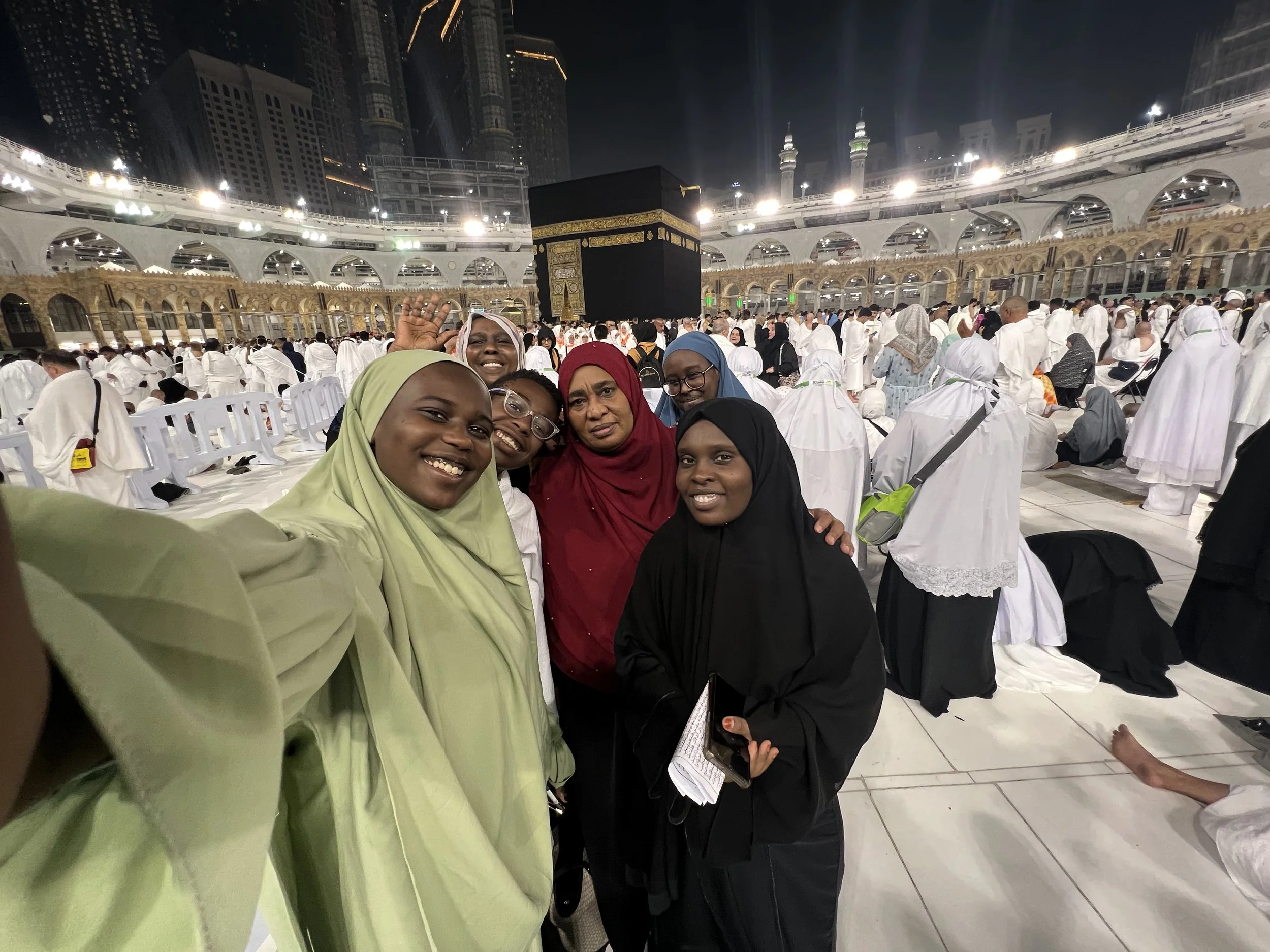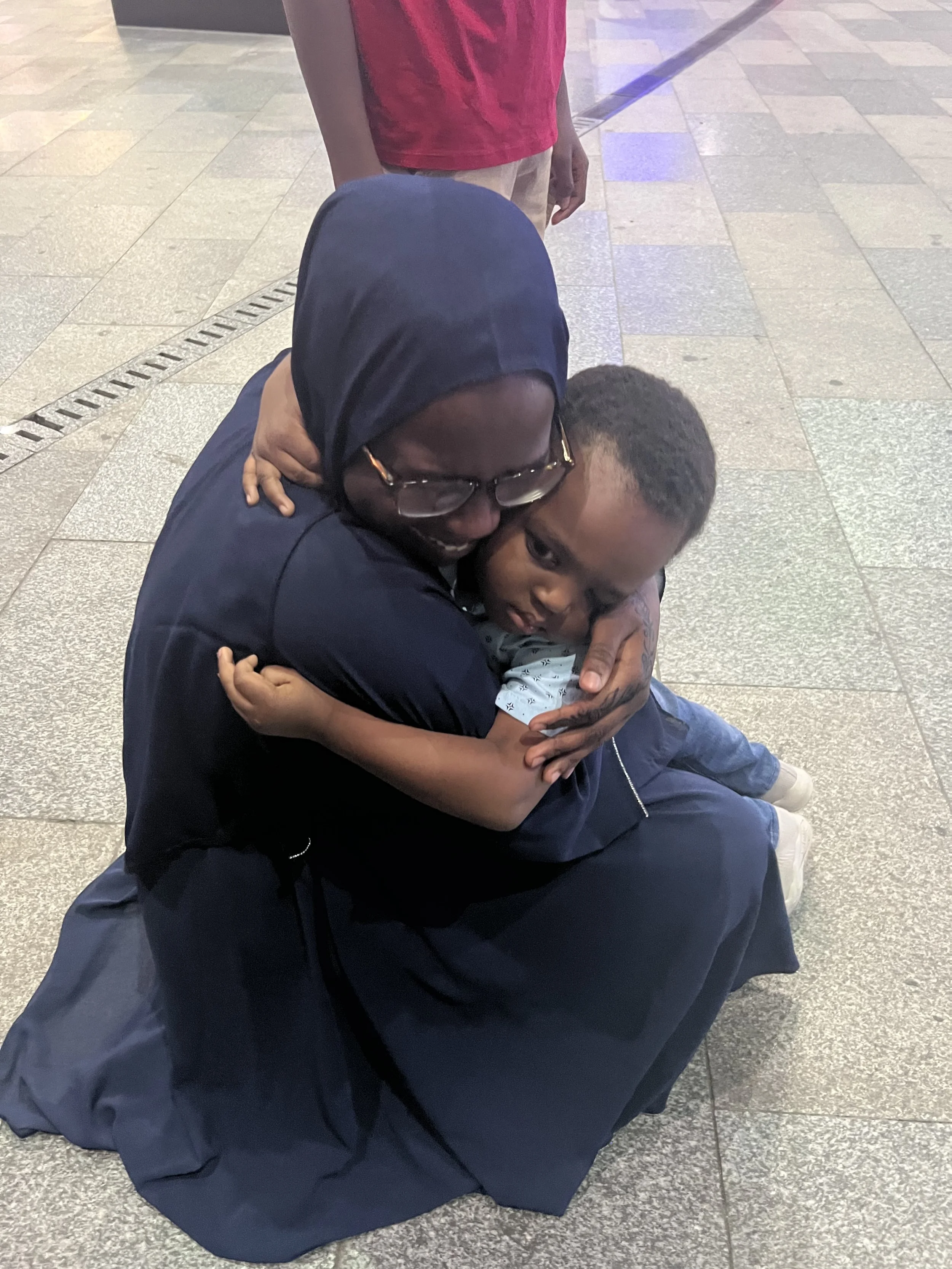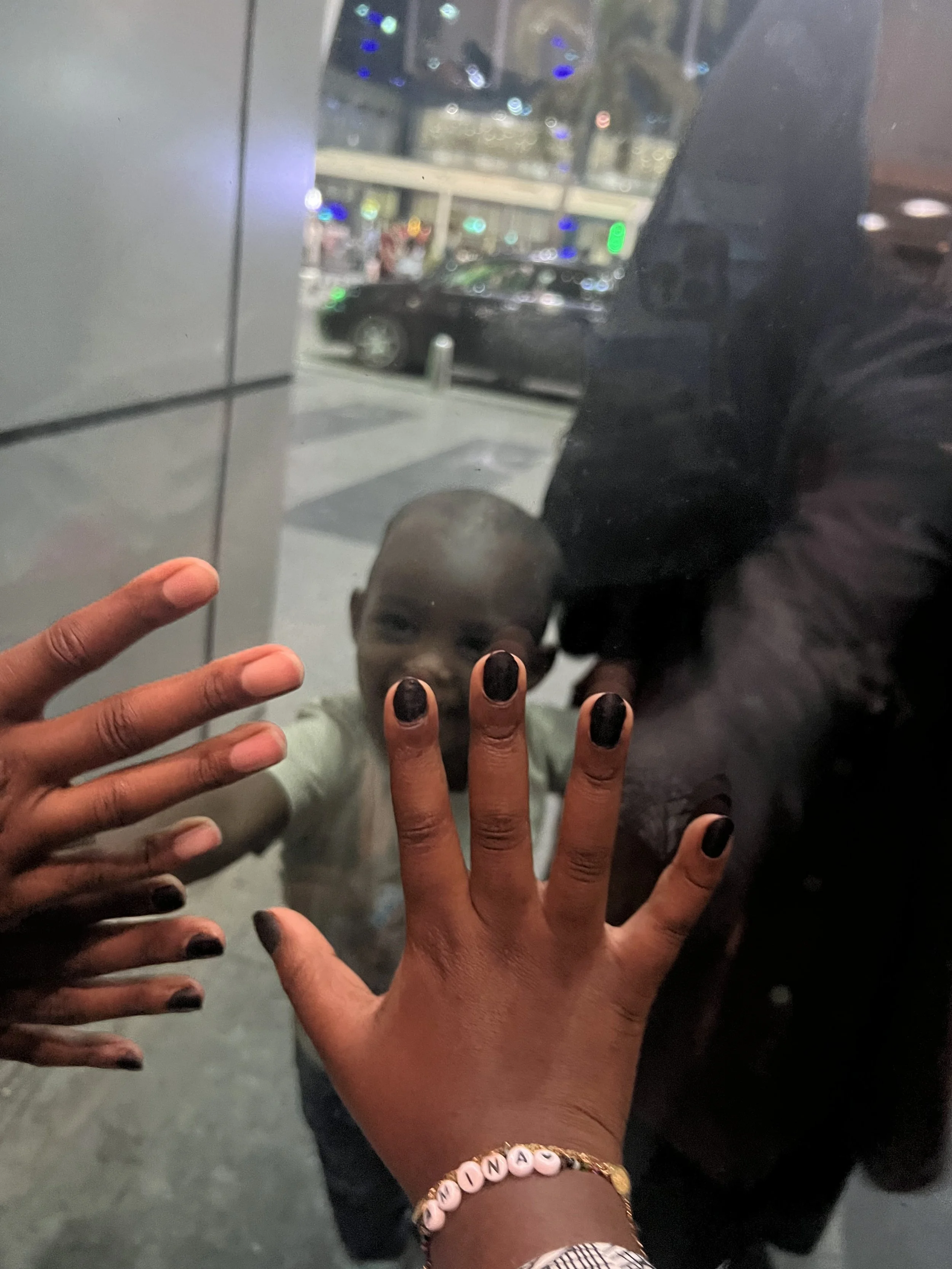Philly Youth Speak Out On Behalf of Their Sudanese Families Impacted by Ongoing War
Lauren Abunassar
Drexel University rising junior, Sudanese-American, Amina Ibrahim still remembers spending this past Ramadan visiting family members displaced from Sudan to Egypt following the outbreak of the civil war in 2023. She describes the trip as both a relief and a horrifying window into the suffering Sudanese are experiencing. Her own family fled to Egypt as fighting between rival militaries in Sudan, the Sudanese Armed Forces (SAF) and the Rapid Support Forces (RSF), turned into a full-scale war. Over the past year, as violence escalated, Ibrahim has witnessed the toll of the conflict on her family. From a distance, they work to send money to loved ones abroad while monitoring their safety and the fate of the Sudan they’ve been forced to leave behind. But Ibrahim’s family is not alone in this difficult balancing act. In Philadelphia, there is a substantial Sudanese youth community alongside Ibrahim working to bring Sudan into focus.
Above, Amina Ibrahim waves the Sudanese flag in Philadelphia. “One thing I’ve learned is that Sudanese people are unnecessarily strong,” she told Al-Bustan. Photo by Casey Alvis.
Drexel students Lana Rizig, Amina Ibrahim, and Mohamed Fadul raised awareness about the Sudanese struggle at Drexel University’s Sudan Awareness Week teach-in. Credit: Drexel Muslim Student Association.
Inspired by Drexel University’s Palestine teach-in earlier this year, Ibrahim and her fellow Sudanese-American classmate Lana Rizig organized a Sudan Awareness Week teach-in on campus in February. Simultaneously, the Sudanese Youth of Greater Philadelphia have also been working to maximize their impact on local activism. It’s all a part of a concerted effort to amplify the voices of Sudanese both abroad and in the U.S., as the community reconciles with the impact of the war.
Today, Sudan faces the world’s largest hunger crisis as food security dwindles. The United Nations has been appealing to all parties in Sudan to observe a ceasefire. The organization reports that 25 million Sudanese – half of the country’s population – require life-saving humanitarian assistance. It’s asking the international community to support the currently underfunded 2024 Sudan Humanitarian Response Plan. Meanwhile, over 15,000 have been killed and over 8 million have been displaced.
At Drexel University, Ibrahim partnered with her fellow Sudanese-American classmate Lana Rizig to talk about their personal connection to Sudan at the February teach-in. The event aimed to educate students about the conflict, raise money for displaced and stranded Sudanese, and start a conversation on the history of Sudanese resiliency and on the beauty of its culture. The lack of U.S. media coverage of the crisis is part of what inspired Ibrahim to participate in the teach-in.
Ibrahim lost two grandparents to the war in Sudan. Since 2023, her Sudanese family has been displaced to Saudi Arabia and Egypt. Her cousins haven’t seen their mother for a year since Egypt has restricted passage to those coming directly from Sudan and their mother is stuck in Saudi Arabia.
Amina Ibrahim and family reunited in the holy city of Makkah. Pictured here is Ibrahim’s aunt and cousin, unable to join displaced family in Egypt and sheltering in Saudi Arabia instead. Photo by Amina Ibrahim.
For Ibrahim, originally from Virginia and now studying marketing and film at Drexel, her trip to Egypt was a chance to hear her family’s stories about navigating and fleeing the outbreak of violence. It was the first time she was able to truly discuss the trauma of the conflict and the brutal violence still sweeping the region.
“They were telling me things and showing me things [that] I wasn’t getting in the U.S. [news] because it simply wasn’t being covered or it was being overshadowed,” Ibrahim told Al-Bustan. This included a story about the many Sudanese who strapped themselves en masse to pickup trucks with the hopes of being smuggled over the border to Egypt. Trucks would lurch forward at neck-breaking speeds to avoid the police. It was a dangerous journey, but in some cases, the most realistic avenue towards survival. Ibrahim’s family told her about a woman who was holding her child in her arms on such a journey. When the truck they were strapped to hit a bump, the child fell and the woman faced an excruciating split-second decision: she jumped out of the truck after her child and was not seen again. “She knew she was not willing to live without her child,” Ibrahim said. “What other choice was there to make?”
Stories like these are brutal and crucial revelations for members of the Sudanese diaspora. “It’s difficult to know what’s going on,” said Ibrahim, “but at some point, we need to know… I feel I’ve been oblivious and wouldn’t have known if I hadn’t gone to Egypt and had these hard conversations with my family.”
Rizig, who graduated Drexel in December 2023, felt similarly compelled to speak at the teach-in, in part because of the ways it’s impacted her family, but also because of the lack of awareness on campus.
“I’m a big believer that if there isn’t a space [for you], you [should] create one,” Rizig told Al-Bustan. With plans to study international law at Fordham Law School, Rizig is intent on using her law degree and her activist efforts to bring attention and aid to Sudan.
“You sit there every day wondering if they’re okay. It keeps you up at night.”
Rizig has struggled to endure the crisis from a distance. During periods of internet blackout that plague Sudan, Rizig has faced uncertainty about the fate of her family there. She remembers sitting in classroom lectures at Drexel, filling out immigration applications for family members living abroad. Some have been displaced to the United Arab Emirates (UAE), some to Egypt, while others were marooned in Sudan because their passports were destroyed when the conflict started.
Rizig also notes that family members seeking safety in Egypt, where processing fees can be astronomical, have had to pay thousands of dollars to expedite the visa process. Rizig's aunt and her four kids — aged 18, 14, 9, and 8— made it to Egypt, but haven’t been in school for a year. Meanwhile, Rizig and her family have still not been able to contact her grandmother’s brother in Wad Madani. “All we can do is pray he is safe,” Rizig said. But beyond prayers, action and education are key to bolstering aid and shifting Western misunderstanding, stigmatization, and silence, says Rizig.
“There’s a specific narrative about this being a civil war,” said Rizig. “But those in Sudan have been saying this is not a civil war because of the amount of foreign intervention. And when you say ‘civil war,’ people are immediately desensitized because they think, ‘Oh. These people are just fighting amongst themselves…’ This also contributes to a lack of awareness.”
Amina Ibrahim’s sister, Ayah, greets their cousin’s son after arriving for a visit in Cairo. Photo by Amina Ibrahim.
Ibrahim also laments the portrayal of Sudan as “just another African country in shambles.” That attitude has been used to excuse Western apathy and even misunderstanding within the Sudanese diasporic community itself, according to Ibrahim.
“A lot of Sudani people are not very well educated on the extent and detail on what is going on,” she said. Ibrahim says that ignorance may be a result of shock, exhaustion, disillusionment, and the fact that learning about the conflict must come secondary to providing for one’s family. Finally, many Sudanese members of the diaspora have felt a need to prioritize assimilation in the face of intergenerational trauma that has never really stopped unfolding.
“Don’t get me wrong, I love being a Muslim. But it almost seems as though everything has to come down to ‘we just have to pray everything will get better,’” said Ibrahim. “I was on the phone with my mom the other day and I had to say, 'This is not going to get better without action.’ One thing Sudanese people, it’s almost like a toxic trait, they will just assimilate … Even when I saw my cousins in Egypt, I said ‘I feel like you guys are just Egyptian now.’ But their response was: ‘We give up. We don’t want to try anymore. We’ve tried enough.”
Perhaps the collective fatigue and disillusionment stem in part from the series of collective losses that Sudanese have faced over the past years. In 2019, Sudanese President Omar al-Bashir was overthrown in a coup. He was subsequently incarcerated, tried, and convicted on multiple corruption charges. Sudanese citizens participated in widespread protests to ensure al-Bashir’s removal. They hoped there would eventually be elections. However, in the wake of the coup, the civilian-military divide widened and the economic crisis deepened. Al-Bashir loyalists attempted more coups, as civilians continued to fight for more civilian rule and less military interference. Two years after al-Bashir was overthrown, on October 25, 2021, the military launched a coup, which led to the dissolution of the transitional Sovereignty Council. At that point, civilian rule became a distant and unlikely possibility.
According to Ibrahim, conversations with family regarding this history helped her understand how a country that rallied for democracy, only to get knocked down, is struggling to find reasons to continue fighting. “If I put myself in their shoes, it’s almost a feeling of like ‘we had something bad and now we have something even worse…’ As my mom explained it, the Sudanese people feel as though ‘We didn’t get democracy but now we don’t even have our country’… And they just want to go home.”
A desire to return home is common among many American-based Sudanese. A member of the Sudanese Youth of Greater Philadelphia, Rymaz Ahmed told Al-Bustan about the concerns she has regarding the impact of distance and trauma fatigue. “You feel the burden of what’s going on back home but you’re not experiencing it directly, so there’s a disconnect,” Ahmed said. “With our younger generation there is a disconnect because for the most part, America is all they’ve known. If tensions are still rising in Sudan, there’s no hope for them to experience culture back home as we did when we were younger.” Cultural identity becomes more fragile, more vulnerable, as a result.
Ahmed and the Sudanese Youth members are collectively working to obtain a leadership role on the Sudanese Community of Greater Philadelphia Executive Board. Lending a youth perspective to the Board, Ahmed notes, would be a crucial step in bridging the generational gap and stoking more activist, educational, and philanthropic efforts to help Sudanese families abroad while connecting Sudanese youth to their culture. “Getting together and learning about what’s going on in Sudan is a way to learn how we can help and what our responsibility is as a diaspora,” Ahmed said.
“…They don’t have time to organize because everyone in the diaspora is taking extra shifts, extra jobs to send money back and provide for family in Sudan.”
Ahmed’s family in Sudan has been displaced to Egypt, Chad, and Ethiopia. Her fellow Sudanese Youth members Elhadi Elhassan and Asawir Abdelgadir have family who have struggled as well: some of Abdelgadir’s family have been unable to move north or south, stranded in the middle of Khartoum, and Elhassan has struggled to get in touch with relatives he would usually hear from every day.
“You sit there every day wondering if they’re okay. It keeps you up at night,” Elhassan said.
When Abdelgadir has been able to get in touch with her grandmother in Sudan, she said the deep reservoir of fear in her voice is undeniable. “You can feel the hopelessness,” she continued.
Elhassan, Abdelgadir, and Ahmed note that they are in a unique position to be able to send support back home. While this has fueled project ideas and committee programming, all three have noted the relative absence of Sudan protests and activism in Philadelphia when compared to New York and Washington D.C. It’s something of an anomaly when considering the substantial Sudanese community in Philadelphia.
“In this photo we were traveling back to America and leaving, and our little nephew still did not understand that we wouldn’t be seeing him for a long time,” Amina Ibrahim told Al-Bustan. “We all put our hands against the glass as a last goodbye.” Photo by Amina Ibrahim
Lana Rizig wonders if this is due partly to diasporic community members falling into a comfort that makes it easier to celebrate culture, but more difficult to highlight geopolitical struggles. This is something she wants to see change. “Another reason may be shock,” she said. “The second the community here starts taking action, they’re finally accepting it’s real.”
Many Sudanese in the diaspora never expected the war to last this long. “They all thought they would be coming back and war wouldn’t take longer than a month or two. And so, they left everything behind [in Sudan] and it feels like they lost a lot more.”
When Amina Ibrahim similarly brought up a lack of action with her mother, she explained it might have to do with more physical fatigue than mental or emotional. “She explained they don’t have time to organize because everyone in the diaspora is taking extra shifts, extra jobs to send money back and provide for not just the family in the U.S. but family home in Sudan.”
In the face of this exhaustion, however, Ibrahim, Rizig, Abdelgadir, Ahmed, and Elhassan are all quick to reiterate how Sudanese culture prioritizes community aid, family support, hospitality, solidarity, and resilience. These values can be traced in the stories Rizig has heard of Sudanese displaced from Khartoum being welcomed to stay with strangers because they have nowhere else to go. They can be traced in the way Ibrahim describes Sudan in one word: “jama’a,” meaning ‘community.’ They can be traced in Elhassan’s beloved memories of drinking shai by the Nile, and in Abdelgadir’s memories of speaking to her grandparents about farming the land in Sudan. They can be traced in Ahmed’s simple confession: “The Sudan I remember was simply home.”
This love of home is part of why these young people are fighting to gather more, to talk more, to protest more, to fight for more attention and aid for the Sudan they love and deeply miss. As Rymaz Ahmed noted: “In spite of everything, I believe Sudan will come back from this. I think our responsibility will continue after the conflict to get our country back to what we’re used to and back to that sense of love and family and everything that we lost in the past year.”
This article is the first in a two-part series on Philadelphia’s Sudanese community.
***
Lauren Abunassar is a Palestinian-American writer and journalist. A Media Fellow at Al-Bustan, she holds an MFA from the Iowa Writers’ Workshop and an MA in journalism from NYU. Her first book Coriolis was published by University of Arkansas Press as winner of the 2023 Etel Adnan Poetry Prize.





